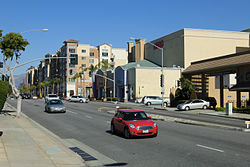Monterey Park, California
| Monterey Park, California | ||
|---|---|---|
| General law city | ||
| City of Monterey Park | ||

A busy section of Atlantic Boulevard
|
||
|
||
| Motto: Pride in the Past, Faith in the Future | ||
 Location of Monterey Park in Los Angeles County, California |
||
| Location in the United States | ||
| Coordinates: 34°2′57″N 118°8′8″W / 34.04917°N 118.13556°WCoordinates: 34°2′57″N 118°8′8″W / 34.04917°N 118.13556°W | ||
| Country | ||
| State |
|
|
| County |
|
|
| Incorporated | May 29, 1916 | |
| Government | ||
| • Type | Council-Manager | |
| • City council | Peter Chan Mitchell Ing Teresa Real Sebastian Stephen Lam Hans Liang |
|
| Area | ||
| • Total | 7.733 sq mi (20.029 km2) | |
| • Land | 7.672 sq mi (19.870 km2) | |
| • Water | 0.061 sq mi (0.158 km2) 0.79% | |
| Elevation | 384 ft (117 m) | |
| Population (April 1, 2010) | ||
| • Total | 60,269 | |
| • Estimate (2013) | 61,085 | |
| • Density | 7,800/sq mi (3,000/km2) | |
| Time zone | Pacific Time Zone (UTC-8) | |
| • Summer (DST) | PDT (UTC-7) | |
| ZIP codes | 91754-91756 | |
| Area code | 323, 626 | |
| FIPS code | 06-48914 | |
| GNIS feature IDs | 1652753, 2411146 | |
| Website | www |
|
Monterey Park is an suburban city in Los Angeles County, California, United States, 8 miles (13 km) east of Downtown Los Angeles. The city's motto is "Pride in the past, Faith in the future". Monterey Park is part of a cluster of cities (Alhambra, Arcadia, Temple City, Rosemead, San Marino, and San Gabriel in the west San Gabriel Valley) with a growing Asian American population, making up 66.9% of its resident population at 2010; 47.7% of its residents are of Chinese descent, the largest concentration of Chinese Americans of any municipality in the United States. According to the 2010 Census, the city had a total population of 60,269.
For at least seven thousand years the land was populated by the Tongva (Gabrielino) Native Americans. The Tongva lived in dome like structures with thatched exteriors, an open smoke hole for ventilation and light at the top. Both sexes wore long hair styles and tattooed their bodies. During warm weather the men wore little clothes but the women would wear minimal skirts made of animal hides. During the cold weather they would wear animal skin capes and occasionally wore sandals made from hide of yucca fiber. With the arrival of the Spaniards, Old World diseases killed off many of the Tongva, and by 1870 very few Native-Americans had survived. In the early 19th century the area was part of the Mission San Gabriel Arcángel mission system and later, the Rancho San Antonio.
...
Wikipedia


